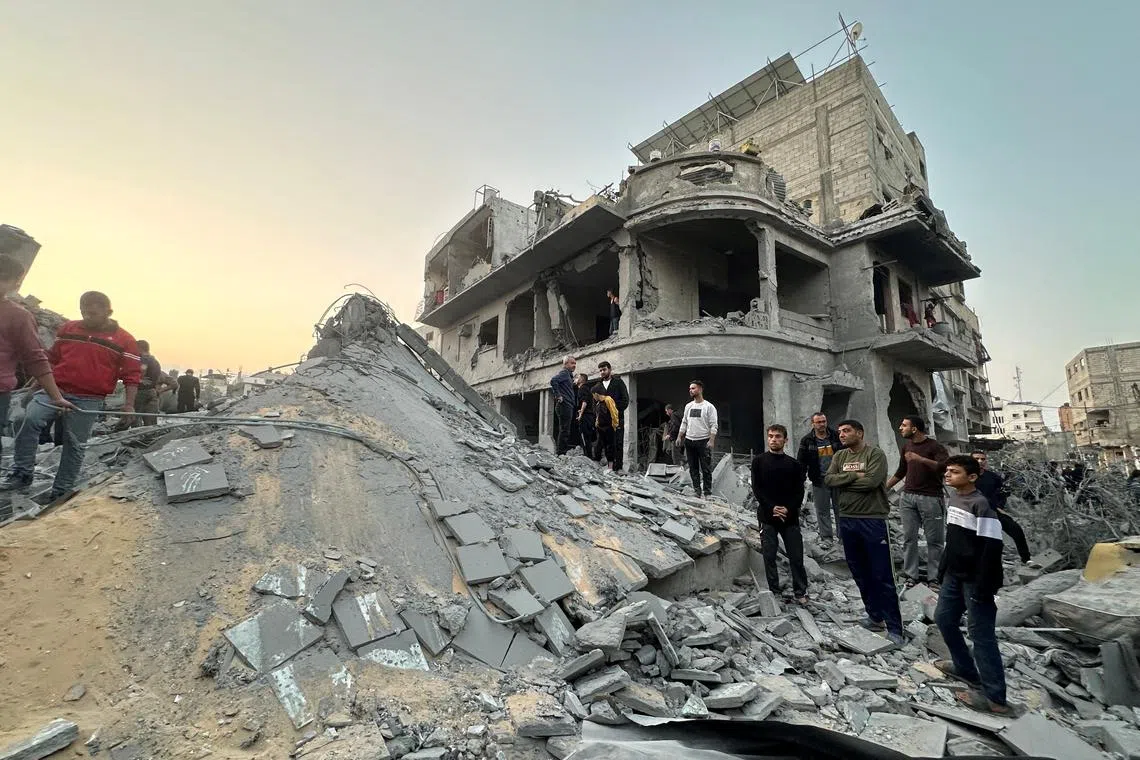Deadly strikes on Gaza, Lebanon as Israel faces aid deadline
Sign up now: Get ST's newsletters delivered to your inbox

Palestinians gathering at the site of an Israeli strike on a house in Jabalia in the northern Gaza Strip on Nov 10.
PHOTO: REUTERS
Follow topic:
JERUSALEM – Israel launched deadly strikes on Gaza and Lebanon on Nov 10, ahead of an American deadline for improved aid delivery to the Palestinian territory.
Rescuers in Gaza on Nov 10 said 30 people, including 13 children, were killed by Israeli strikes in the territory’s north.
The first strike early in the day hit a house in Jabalia, killing “at least 25” people including 13 children and injuring more than 30, the Palestinian territory’s civil defence agency said.
Vowing to stop Hamas militants from regrouping in north Gaza, Israel on Oct 6 began a major air and ground assault.
The United Nations has described the area as under “siege”, and the US set a deadline of this coming week for Israel to get more aid in or face possible cuts to military assistance.
Another strike on the Sabra neighbourhood of Gaza City killed five people, with others still missing, civil defence said.
“A number of civilians are still under the rubble,” it said.
Contacted by AFP, the Israeli military said it was “looking into the reports” of the strikes.
Lebanon’s Health Ministry, meanwhile, said an Israeli strike on the village of Almat, north of Beirut, killed 20 people, including three children, on Nov 10.
In Lebanon’s south, Israeli strikes killed three Hezbollah-affiliated rescuers, the ministry also said.
The war in Gaza erupted with Hamas’ Oct 7, 2023, attack on southern Israel, which resulted in 1,206 deaths, mostly civilians, according to an AFP tally of Israeli official figures.
Israel’s retaliatory campaign has killed 43,603 people in Gaza, according to figures from the Hamas-run territory’s Health Ministry, which the UN considers reliable.
Since late September, Israel has been engaged in a two-front war after turning its focus north towards Lebanon, escalating air strikes and sending in ground troops.
It came after almost a year of tit-for-tat exchanges of fire with Iran-backed Hezbollah. The Lebanese group said it was acting in support of Hamas.
Israel’s main military backer, the US, on Oct 15 warned that it could withhold some of its billions of dollars in military assistance unless Israel improves aid delivery to the Gaza Strip within 30 days – a deadline that expires on Nov 13.
Qatar suspends mediation
State Department spokesman Matthew Miller said at the time that top US officials made “clear to the government of Israel that there are changes that they need to make again to see that the level of assistance making it into Gaza comes back up from the very, very low levels that it is at today”.
The demand came before the Nov 5 election of President-elect Donald Trump, who has promised to give freer rein to Israel.
On Nov 9, a UN-backed assessment warned that famine is imminent in northern Gaza.
Aid shipments allowed to enter Gaza were now lower than at any time since October 2023, according to the Integrated Food Security Phase Classification (IPC) report.
The alert from the Famine Review Committee warned of “an imminent and substantial likelihood of famine occurring, due to the rapidly deteriorating situation”.
Israel’s military questioned the report’s credibility.
“To date, all assessments by the IPC have proven incorrect and inconsistent with the situation on the ground,” a military statement said, denouncing “partial, biased data and superficial sources with vested interests”.
IPC says its process is “evidence-based” and ensures “a rigorous, neutral analysis”.
The heads of UN agencies in early November described north Gaza as “under siege” and denied “basic aid and life-saving supplies”.
US Secretary of State Antony Blinken hopes to use the remaining weeks of his term to press for an end to the Gaza and Lebanon wars, a spokesman said on Nov 7, before fellow mediator Qatar said on Nov 10 that it had suspended its role in trying to broker a ceasefire deal.
“Qatar would resume those efforts... when the parties show their willingness and seriousness,” Doha’s Foreign Ministry spokesman Majed Al-Ansari said in a statement.
Meanwhile, Arab and Muslim leaders have begun arriving in Saudi Arabia for a summit scheduled for Nov 11 that will focus on Israel’s wars in Gaza and Lebanon, Saudi state media said.
The Saudi Foreign Ministry announced the summit in late October during the first meeting of an “international alliance” pushing for a two-state solution to the Israeli-Palestinian conflict.
Attendees will “discuss the continued Israeli aggression on the Palestinian territories and the Lebanese republic, and the current developments in the region”, the official Saudi Press Agency said on Nov 10.
It comes one year after a similar gathering in Riyadh of the Cairo-based Arab League and the Jeddah-based Organisation of Islamic Cooperation (OIC), during which leaders condemned Israeli forces’ actions in Gaza as “barbaric”.
The Saudi state-affiliated Al-Ekhbariya news channel broadcast footage on Nov 10 of Nigerian President Bola Tinubu and Lebanese Prime Minister Najib Mikati landing in Riyadh.
Pakistani Prime Minister Shehbaz Sharif was also scheduled to attend, the Pakistani Foreign Ministry has said, adding that he planned to call for “an immediate end to the genocide in Gaza” and the “immediate cessation of the ongoing Israeli adventurism in the region”.
The 57-member OIC and 22-member Arab League include countries that recognise Israel and those firmly opposed to its regional integration.
The 2023 summit in Riyadh saw disagreement on measures such as severing economic and diplomatic ties with Israel and disrupting its oil supplies. AFP

